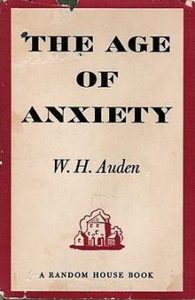The Rev. Noah Van Niel
Chapel of the Cross
November 22, 2018
Thanksgiving Day (B): Joel 2:21-27; Psalm 126; 1 Timothy 2:1-7; Matthew 6:25-33
In 1948 W.H. Auden published a very long poem which he famously titled “The Age of Anxiety.” It’s a poem about the search for meaning and identity in the tumultuous years after the close of the Second World War and Auden’s name for the age obviously struck a chord—his poem won the Pulitzer prize that year, and the phrase has remained in the popular consciousness ever since.
I do not doubt that those post war years were an anxious time; the world was struggling to regain its footing after the utter devastation of two world wars in 30 years and it was unclear if it could. But one might argue that we too are living in our own “Age of Anxiety,” right now. Anxiety is currently the most common mental health disorder in the US. Roughly a third of adults and adolescents suffer from it.[1] And that number only counts those whose anxiety is so inhibiting they are forced to seek out medical care. It doesn’t account for those who exist in a general state of stress, worry, fear or concern, a group of people which seems to include, well, almost everyone I talk to. I have lost count of the number of times someone has confided in me that they are really, really worried about things to the point that it makes them feel sick, or nervous or angry. More and more, I fear, anxiety, broadly defined, is our prevailing state of existence. This goes for young and old, rich and poor alike. And this personal anxiety echoes at the global level as well, as the world order currently seems to exist in a state of general dis-ease about what the future might hold.
So perhaps we are in a new age of Anxiety. Or perhaps Auden’s “Age of Anxiety” never ended, maybe our fears and worries and concerns have just shifted over the decades. Or perhaps it was ever thus…
“Jesus said, ‘I tell you do not worry about your life,’” that’s our Gospel passage from this morning. He’s in the middle of his sermon on the mount, and he devotes a significant portion of his time to trying to alleviate the anxieties of his hearers. Maybe they lived in an “Age of Anxiety” too. A time when food and shelter and clothing were less sure, when they had to fear that anything from the whims of weather or their imperial overlords might rob them of their lives at any moment. Perhaps they had more reason than any of us for anxiety. Or maybe the truth is part of what it means to be human is to be anxious; maybe we worrywarts by nature. And maybe that is why Jesus speaks so directly into that deep and tender part of us, with such gentle insistence, “do not worry.” Over and over again he says it to his crowd. “Can any of you, by worrying add a single hour to your life? Look at the birds, look at the lilies, they worry not, and they are well cared for…Don’t worry, about tomorrow, for tomorrow will bring worries of its own. God will take care of you.” I bet even many, many ages ago, there were some knowing smiles at these words.
And to his anxious listeners, Jesus says, that rather than worrying so much they should instead spend that time and energy on something more productive: striving to bring about the Kingdom of God. If you do that, he says, everything else will fall into place. And one of the best places we can begin if we would like to strive for the Kingdom of God, if we would like to ease the anxiety that we carry around with us, is thanksgiving. Not this afternoon’s meal—there’s little hope for making that an anxiety-free affair, I’m afraid. But in the specific and consistent act of giving thanks. Gratitude is a powerful antidote to anxiety. It’s not the only antidote, but it’s a big one. Because what gratitude does for us is not just show us all the good things in our life that we have to be thankful for and therefore shift our mood from the minor to the major key. It also reassures us; it eases our anxieties by reminding us of all the ways God has provided for us in the past so that we may look to the future with hope, not fear. Gratitude reanimates the promise that God has been with us, is with us, and will always be with us. This is what the prophet Joel is doing for the suffering people of Israel in our Old Testament lesson—“Do not fear, be glad and rejoice. The soil will again produce grass, the trees will again produce fruit; rain and grain shall come again in abundance, wine and oil shall overflow, [and] you shall know that I am in the midst of Israel, and that I, the Lord, am your God and there is no other.”
So today as you gather for what I hope is a plentiful feast with people you love, use this as an opportunity look around and notice where God is, and has been, and let that reassure you that God will be. For therein lies the soothing balm to your fearful hearts, therein lies the comfort and courage to wash your worries away, therein lie the seeds of the Kingdom of God, a Kingdom where we all shall feast at that heavenly banquet table reveling finally, in an age not of anxiety, but of thanksgiving instead.
[1] http://time.com/5269371/americans-anxiety-poll/
